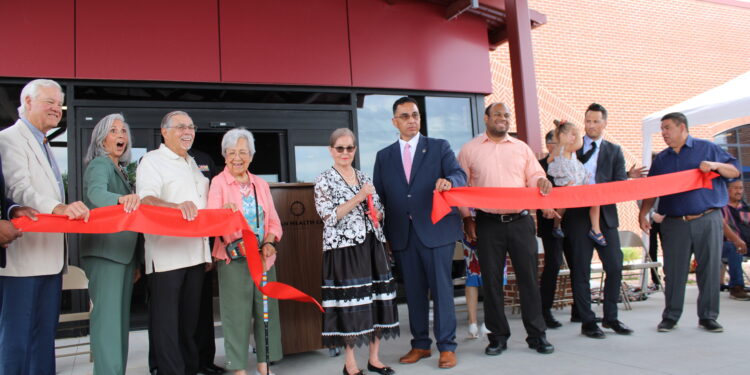TULSA – Tribal citizens in the Tulsa metro will now have access to expanded medical services provided by the Indian Health Care Resource Center (IHRC). The nonprofit cut the ribbon on their new 62,000 square foot expanded facility on July 2. Leaders in attendance included Muscogee (Creek) Nation Second Chief Del Beaver and Tulsa Mayor Monroe Nichols. This year marks the 49th year the nonprofit has served the Tulsa community.
The opening ceremony saw a strong Mvskoke presence. The Mvskoke Women’s Honor Guard, Este Cate Hoktvke Suletawv, presented the colors. A flag song was performed by David Bible and other local community members. Second Chief Beaver led the opening prayer.
The expanded facility has been in development for five years. Construction lasted 18 months. According to Indian Health Care Resource Center CEO Carmelita Wamego Skeeter (Citizen Potawatomi Nation), the expansion will add more services the nonprofit already provides. This includes optometry, dental, and wellness services.
“It will offer more dental services which are desperately needed because we have a waiting list. It will offer more optometry services because we are hiring another optometrist in addition to another dentist and dental hygienist. We enlarged our wellness department. We will have physical activities for anyone that wants to come in and take part in the gym.” Skeeter said.

The expansion will overall double the size of the IHCRC’s current facility. The drive- through pharmacy will expand from two lanes to five. Optometry will expand from three to six exam rooms and dental operatories will expand from four to ten.
Nichols was ecstatic about the IHCRC’s opening and the potential it has to offer expanded services to Tribal citizens in Tulsa. He remarked that while the expansion is a victory for Indian Country, there is still more that can be done to address the problem of healthcare disparities among Native American populations.
“I’m just grateful because we have these strong partnerships, we have this clinic, this 49-year commitment to providing first class care to Indian Country right here in Tulsa,” Nichols said. “I’m excited about the 62,000 square foot expansion but I’m thinking we need more. We need more because we know that health outcomes are not what they should be across ethnicities. We know there is more that we have to do but today is a day that we can celebrate.”

Skeeter was one of the IHCRC’s original four employees when the nonprofit opened in 1976. The main change Skeeter has seen during her long tenure with IHCRC is the greater focus community members have placed on their health because of access to healthcare through the nonprofit. This has cut down on the amount of procedures due to diabetes complications and the need for dialysis. Skeeter said the biggest health issue they are fighting now is obesity.
Throughout her 49 year career at IHCRC, Skeeter has found that her favorite part about her job is meeting new faces and serving others.
“Meeting people, meeting individuals and being able to help any way that we can.” Skeeter said.
The IHRC is located at 530 S. Peoria Ave. To stay up to date on IHRC events, visit their website, ihcrc.org. They can also be found on Facebook, Indian Health Care Resource Center.





